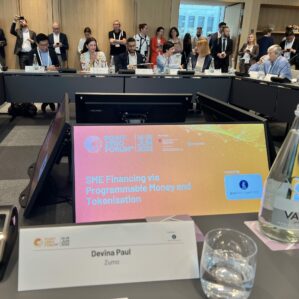
Zumo's response to the All-Party Parliamentary Groups call for evidence on the Crypto Enquiry 2022.
Preface general note
- We welcome this consultation as a positive and proactive step in meeting the UK’s stated ambitions to act as a global cryptoasset hub.
- In our responses, we deliberately restrict our comment to those areas and considerations closest to our business operations as a UK-headquartered and FCA registered cryptoasset firm.
Comments
In response to i. – the UK as a global home of crypto investment; opportunities & risks
- We see key opportunities for the UK to establish positive jurisdictional differentiation; a position of subject-matter industry leadership; and a digital asset environment that will foster jobs, skills & commerce.
- The flipside of these respective opportunities is the risk of incompatibility in treatment with other jurisdictions, being left behind in establishing a fit-for-purpose regulatory framework; and failing to capture a meaningful share of the crypto economy.
We are encouraged that:
- The UK has clearly stated its ambitions to embrace the crypto economy. If followed through in policy, this can provide a positive point of differentiation from neighbouring jurisdictions, notably the EU bloc, which is seen as more narrowly regulation-focused and crypto-sceptic (see, for instance, MiCA and, particularly, TFR).
- Proactive action has been taken early on in legally and operationally important questions such as the recognition of smart contracts or the classification of digital assets, which provides a continued framework-defining market leadership opportunity in evolving areas of the industry.
- The UK is regarded as among the leading locations with respect to industry jobs and skills, and as a supporter of innovation through initiatives such as the proposed regulatory sandbox for DLT technology, building on historic leadership in financial market infrastructure.
We are concerned that:
- While innovation-supporting and crypto-friendly policy and regulation is very much to be welcomed, this must not come at the cost of regulatory compatibility with important trading markets. It must be made as easy as possible, through passporting arrangements or similar, for UK-based cryptoasset businesses to access strategically important global markets.
- The industry currently operates within a framework that does not extend beyond AML compliance, with proposed stablecoin regulation still at the beginning of its progress through the legislature and customer protections close to non-existent. The UK must not be left behind in establishing fit-for-purpose regulatory frameworks, else the rules will be dictated from elsewhere.
- Despite positive news with regards to business and jobs, the equal evidence on the flipside of crypto businesses departing the UK or else finding themselves unable to achieve regulatory approval in the UK. Revolut is one current example of this (as of the time of writing, remaining on the FCA temporary register despite recently achieving approval within the EU). Regulatory processes must not be such that they drive away robust and well-intentioned businesses, while acknowledging the clear need to sift out bad actors.
- In terms of the global crypto landscape, the lack of any meaningful sterling (GBP) representation in the Web3 economy. The USD currently dominates asset-backed stablecoins, exposing UK consumers to additional exchange rate risk, funnelling money away from the pound and leaving the UK straggling in fiat-linked digital assets.
In response to ii. – the UK’s current approach to regulation of crypto and digital assets
Further to the comment provided to item (i), much of which applies, we would comment that:
- The closure of the temporary register and the length/complexity of the FCA registration process acts as a barrier to business.
- This process is itself undermined by the issue of regulatory arbitrage, and the continuing situation of crypto services provided to UK consumers from offshore.
- We believe the issue is likely to be at least partially resolved over time by the ongoing process of global regulatory harmonisation, with the FSB global financial watchdog due to report on regulatory and supervisory approaches in October and the IMF calling for comprehensive, consistent and coordinated crypto regulation. As the FATF travel rule recommendations have shown, this does not necessarily mean that implementation at the national level will be swift. Governments, and the industry as a whole, require time (and the availability of suitable tools and processes) to react to the requirements of regulation.
- In this global competition, the UK needs to balance the considerations of global alignment – the action it takes to ensure interoperability and friction-free trade with other jurisdictions – and the protection of its interests. It is notable that crypto regulation is coming to be seen as a projection of power with, as one example, the EU seeking to set quantitative limits on the issuance and use of EMTs denominated in foreign currency through its MiCA legislation.
In response to iii – the role and current approach of UK regulators
- It is our position that, for adoption at scale, the UK cryptoasset industry requires a clear, proportionate regulatory framework and appropriate consumer protection.
- Currently, the industry lacks in both. Oversight is limited to AML, and the FCA is tightly constrained in its supervisory remit, which does not extend to consumer protection.
To improve the situation, we consider:
- That the regulatory framework must rapidly progress to implementing the proposed stablecoin regulation, and from there clarity of treatment in the rest of the space, including yet to be broached areas such as DeFi and NFTs.
- That overall regulator remit must be widened to consider consumer protections within custodial solutions, be it due complaints process or deposit protection schemes.
- That there must be regulatory safe harbours (as provided by sandbox environments) that support innovation in the meantime.
- That the above should be ensured by a single supervisory authority wherever possible, and not subject to the sort of jurisdictional wrangling observed in the US.
In response to v – consumer protection and economic crime
On the subject of consumer protection:
- If the UK is serious about acting as a global cryptoasset hub, regulators must move beyond risk disclaimers and consumer warnings towards material progress in consumer protection.
- Currently, consumers find themselves in an unenviable position. On the one hand, crypto products come with intimidating, off-putting risk statements – a rhetoric reinforced by regulators worldwide. On the other, the high-profile implosions of multiple custodial platforms, Celsius being a prominent example, has left it quite clear those consumers’ status as unsecured creditors with very little recourse in the event of platform failure.
- Warnings cannot come without solutions. Mass consumer adoption will be achieved only when the consumer can expect the same protections and rights as they would for any other regulated financial product.
On the subject of economic crime, we would ask:
- What data is being captured at the regulator level to determine and monitor the effectiveness of compliance procedures in moving the needle on economic crime?
- In what ways are blockchain analysis tools being used to leverage blockchain’s in-built transparency, and how could we do more to leverage blockchain-native solutions/advantages such as on-chain proof of reserves, or decentralised identity solutions?
Zumo, 5 September 2022
…………………………………….
Zumo contacts:
Michael Johnson, michael@zumo.money
Daniel Taylor, daniel.taylor@zumo.money





















